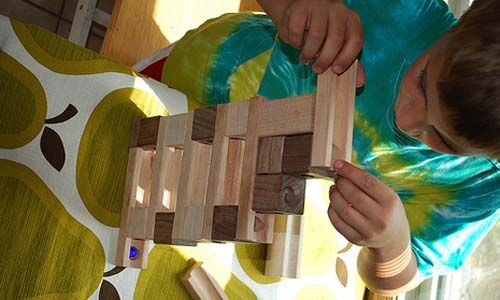So many global celebrations center around gift giving. For those of us who want to encourage our children to live simply, these occasions often invite feelings of frustration when well-meaning family and friends bombard our children with gifts that are either excessive in quantity or questionable in quality.
Families committed to living thoughtfully must walk a fine line between protecting our personal convictions while not offending those who don’t hold the same convictions as us.
Gift-giving almost always happens within the parameters of relationship, so with this in mind, a few mindset shifts increase the chance for positive outcomes when this delicate issue is discussed.
Here are four thoughts to consider as you approach this topic with friends and family.
1. Establish the boundaries for your family.
This will look different for every family. Some parents may not want battery-operated toys in their home. Other parents may not want licensed characters at all, while others may reject specific licensed characters as playthings for their children. For other families, it’s not a matter of which toys are given, but rather a matter of how many toys their children receive.

When your children are little, it’s easy to construct a concrete boundary regarding their toys. As your children get older, find ways to make the boundary a collaborative effort where all opinions and preferences are taken into the decision-making process.
A boundary sounds restrictive, but it actually provides freedom — freedom from guilt and laborious decision-making about what comes into your house.
2. Keep a proper perspective on the boundary you’ve established.
Remember: you have zero control over what gifts other people give to you or your children. You can gently inform and provide guidance (more on that in a moment), but ultimately it’s the gift-giver spending the money, time, and energy on the gift, and decisions about what and how many are made by the gift-giver.
Also remember: you have complete control over what happens to the gifts you and your children receive. This is where you’ll find freedom from that boundary about what gifts are acceptable for your family. With guiding principles in place, it’s much easier to determine which gifts will be kept and which will find new homes, based on your family’s convictions.
3. Provide helpful guidance.
Your friends and family cannot read your mind. It isn’t fair to expect them to respect your boundary about gifts if you haven’t made an attempt to express your thoughts on the matter.

Be sensitive to the dynamics of each relationship as you consider how to approach this conversation. In some relationships, open and direct conversation is welcome and encouraged. Other relationships, however, may call for a more indirect and delicate approach.
Examine the relationship and construct ways to strengthen and build it up through a discussion, rather than alienating or distancing.
When it comes to the logistics of providing helpful guidance, there are two schools of thought:
• Have a preemptive conversation.
In relationships where direct and honest conversation is the norm, you may feel comfortable talking with (or sending an email or text to) friends or family members, saying something like:
“We’ve noticed lately that the toys the kids tend to play with most are the ones that really challenge them to use their imaginations. We’d love to focus on not having toys in the house that run on batteries and basically do all of the playing for them. With Jack’s birthday coming up, I have a few ideas about what gifts I know he’d truly enjoy — would you like to hear them?”
• Provide gift suggestions only when suggestions are requested.
For some, a preemptive conversation about gifts feels like a violation of etiquette or social norms. In this case, have a list of ideas prepared to share if and when suggestions are asked for. You can list broad categories, suggest specific items, or even provide links to stores or catalogs.
Regardless which approach you take, avoid stipulations and focus on helpful guidance. Even the most gracious gift-givers may bristle with instructions like, “NO cheap, plastic-y junk, please!”
Focus the discussion on what you know your children will enjoy: “Jane is so into drawing, painting, and creating right now. I know she’d be thrilled to have new art supplies!”
4. Practice gratitude (even when you’re disappointed).
In our wedding ceremony’s homily, the pastor repeated this three times: “People are more important than things.”
It’s such a simple but powerful truth. Yes, it’s good to be careful and mindful of what comes into our home. Yes, it can be difficult to quietly remove toys that don’t meet our family’s standards. Yes, it’s hurtful when our boundaries are not respected by those we love.

Ultimately, though, we show love in our relationships when we let them learn what we value as a family. Then, we can choose to respond with grace and gratitude, regardless of what they give.
It’s possible to honor the relationship with thanks for the thoughtfulness, even while knowing the gift may not find a permanent place in your home.
Special occasions invite celebration. Confident and healthy boundaries help us celebrate the people in our lives, complete with freedom from worrying about the stuff.



